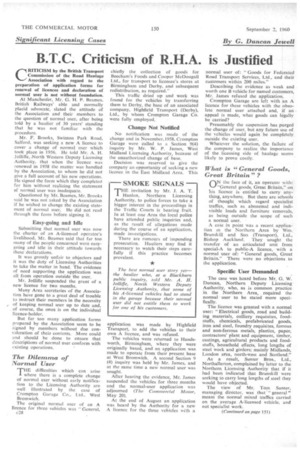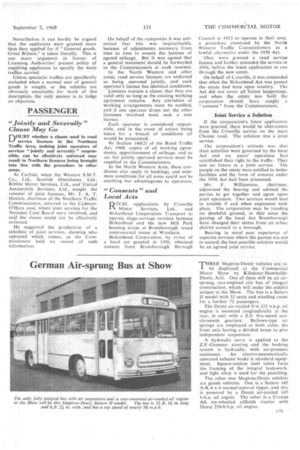Significant Licensing Cases
Page 64

Page 67

If you've noticed an error in this article please click here to report it so we can fix it.
B.T.C. Criticism of R.H.A. is Justified
CRITICBM by the British Transport Commission of the Road Haulage Association with regard to the preparation of application forms for renewal of licences and declaration of normal user is not without foundation.
At Manchester, Mr. G. H. P. Beames, British Railways' able and normally placid advocate, slated the attitude of the Association and their members to the question of normal user, after being told by a haulier of 30 years' standing that he was not familiar with thc procedure.
Mr. F. Brooks, Swinton Park Road, Salford, was seeking a new A licence to cover a change of normal user which took place in 1956. He told Mr. A. H. Jolliffe,..North Western Deputy Licensing Authority, that when the licence was renewed in 1958 the matter was handled by the Association, to whom he did not give a full account of his new operations. He signed the form which they completed for him without realizing the statement a normal user was inadequate.
Questioned by Mr. Beames, Mr. Brooks said he was not asked by the Association if he wished to change the existing statement of normal user. He did not read through the form before signing it.
Easy-going and Idle
Submitting that normal user was now the charter of an A-licensed operator's livelihood, Mr. Beames said that far too many of the people concerned were easygoing and idle in their attitude towards these declarations.
It was grossly unfair to objectors and it was the duty of Licensing Authorities to take the matter in hand. The evidence of need supporting the application was all from operation outside the user.
Mr. Jolliffe suspended the grant of a new licence for two months.
Many Area secretaries of the Association have gone to a great deal of trouble to instruct their members in the necessity , of keeping normal user up to date and, of course, the onus is on the individual licence-holder.
But far too many application forms prepared by the Association seem to be signed by members without due consideration of their contents. More could and should be done to etisure that descriptions of normal user conform with existing operations.
The Dilemma of Normal User
THE difficulties which can arise
where there is a complete change of normal user without early notification to the Licensing Authority are well illustrated by the case of Crompton Garage Co., Ltd., West Bromwich.
The original normal user of an A licence for three vehicles was "General, c.28 chiefly the collection of goods for Beecham's Foods and Cooper McDougall Ltd., for transport to licensee's stores at Birmingham and Derby, and subsequent redistribution, as required."
This traffic dried up and work was found for the vehicles by transferring them to Derby, the base of an associated company, Highfield Transport (Derby), Ltd., by whom Crompton Garage Co. were fully employed.
Change Not Notified
No notification was made of the change and in November.1958, Crompton Garage were called to a Section 9(4) inquiry by Mr. W. P. James, West Midland Licensing Authority, because of the unauthorized change of base.
Decision was reserved to give the company an opportunity of seeking a new licence in the East Midland Area. This application was made by Highfield Transport, to add the vehicles to their own A licence, and was refused.
The vehicles were returned to Handsworth, Birmingham, where they were originally based, and an application was made to operate from their present base at West Bromwich. A second Section 9 (4) inquiry was held by Mr. James, and at the same time a new normal user was sought.
After hearing the evidence, Mr. James suspended the vehicles for three months and the normal-user application was adjourned (The Commercial Motor, May 20).
At the end of August an application was heard by the Authority for a new A licence for the three vehicles mth a normal user of: "Goods for Federated Road Transport Services, Ltd., and their customers within 200 miles."
Describing the evidence as weak and worth one B vehicle for named customers, Mr. James refused the application.
Crompton Garage are left with an A licence for these vehicles with the obsolete normal user attached and, if an appeal is made, what goods can legally be carried?
Presumably the suspension has purged the change of user, but any future use of the vehicles would again be completely outside the existing user.
Whatever the solution, the failure of the company to realize the importance of the licensing side of haulage seems likely to prove costly.
What is "General Goods, Great Britain" ?
QN the face of it, an operator with: "General goods, Great Britain," on his licence is entitled to carry anything, anywhere. But there are schools of thought which regard specialist traffics, such as abnormal and indivisible loads and furniture removals, as being outside the scope of such a normal user.
A case in point was a recent application in the Northern Area by Wm. Brunskill and Son (Transport), Ltd., Bishop Auckland. They sought the transfer of an articulated unit from special-A to public-A licence, with a normal user of: "General goods, Great Britain." There were no objections to the application.
Specific User Demanded
The case was heard before Mr. G. W. Duncan, Northern Deputy Licensing Authority, who, as is common practice in the Northern Area, required the normal user to be stated more specifically.
The licence was granted with a normal user: "Electrical goods, road and building materials, colliery requisites, foodstuffs, chemicals, prefabricated goods, iron and steel, foundry requisites, ferrous and non-ferrous metals, plastics, paper, contractors' plant and equipment, timber, castings, agricultural products and foodstuffs, household effects, long lengths of steel work and girders; mainly Midlands, London area, north-west and Scotland."
As a result, Sunter Bros., Ltd., Northallerton, complained by letter to the Northern Licensing Authority that if it had been indicated that Brunskill were seeking to carry long lengths of steel they would have objected.
The view of Mr. Tom Sunter, managing director, was that '" general" meant the normal mixed traffics carried on the average A-licensed vehicle, and not specialist work. Nevertheless it can hardly be argued that the applicants were granted more than they applied for if " General goods, Great Britain," is taken literally. This is one more argument in favour of Licensing Authorities' present policy of requiring applicants to specify the main traffics carried.
Unless specialist traffics are specifically excluded when a normal user of general goods is sought, or the vehicles are obviously unsuitable for work of this description, the only answer is to lodge an objection.
PASSENGER
"Jointly and Severally" Clause May Go
nOUBT whether a clause used in road
service licences in the Northern Traffic Area, making joint operators of services "jointly and severally" responsible, can be effectively enforced may result in Northern licences being brought into line with the procedure in other areas.
At Carlisle, when the Western S.M.T. Co., Ltd., Scottish Omnibuses, Ltd., Ribble Motor Services, Ltd., and United Automobile Services, Ltd., sought the renewal of joint licences, Mr. J. A. T. Hanlon, chairman of the Northern Traffic Commissioners, referred to the CadmanO'Hara case, where joint services for the National Coal Board were involved, and said the clause could not be effectively enforced.
He suggested the production of a schedule of joint services, showing who operated which routes, as the Commissioners held no record of such information. On behalf of the companies it was submitted that this was impracticable, because of adjustments necessary from time to time to ensure the balance of agreed mileage. But it was agreed. that a general statement should be forwarded to the Commissioners at each renewal.
In the North Western and other areas, road service licences are endorsed as being operated jointly, and each operator's licence has identical conditions.
Licences contain a clause that they are valid only so long as the existing working agreement remains. Any alteration of . Working arrangements must be notified, and if one operator drops out the other licensees involved must seek d new licence.. Each . Each operator is considered responsible, and in the event of action being taken for a breach of conditions all would be prosecuted.
By Section 140(2) of the Road Traffic Act, 1960, copies of all working agreements, apportionment of mileage, and so on, for jointly. operated services must be supplied to the Commissioners.
In the North Western Area, these conditions also apply to backings, and common conditions for all areas could not be anything but advantageous to operators.
"Consents" and Local Acts
RIVAL applications by Crosville Motor Services, Ltd., and Birkenhead Corporation Transport to operate stage-carriage services between Birkenhead and the new Mill Park housing estate at Bromborough raised controversial issues at Wrexham.
Birkenhead Corporation, by virtue of a local act granted in 1930, obtained consent from Bromborough Borough
Council in 1953 to operate in their area, a procedure construed by the North Western Traffic Commissioners as a lawful alternative under the 1930 Act.
They were granted a road service licence and further extended the service in 1956, before. the latest application to run through the new estate.
On behalf of Crosville, it was contended that when the Birkenhead Act was passed the estate had been open country. The Act did not cover all future happenings, and when the estate was built the corporation should have sought ,a "consent" from the Commissioners.
Joint Service a Solution
If the corporation's. latest application were granted, there would be abstraction from the Crosville service on the main Chester road. The solution was a joint service.
The corporation's attitude was that their activities were governed by the local Act and six years' operation had established their right to the traffic. They saw no future in a joint service. The people on the estate were entitled to better facilities and the form of consent under the 1930 Act had been presumed.
Mr. F. Williamson, chairman, adjourned the hearing and advised the parties to get together and agree upon joint operation. Two services would lead to trouble if and when expansion took place. The corporation may be treading on doubtful ground, in that since the passing of the local Act Brornborough have changed their status from an urban district council to a borough.
Bearing in mind past experience of separate services where the parties' are not in accord, the-best.possible solution would be an agreed joint service,








































































































